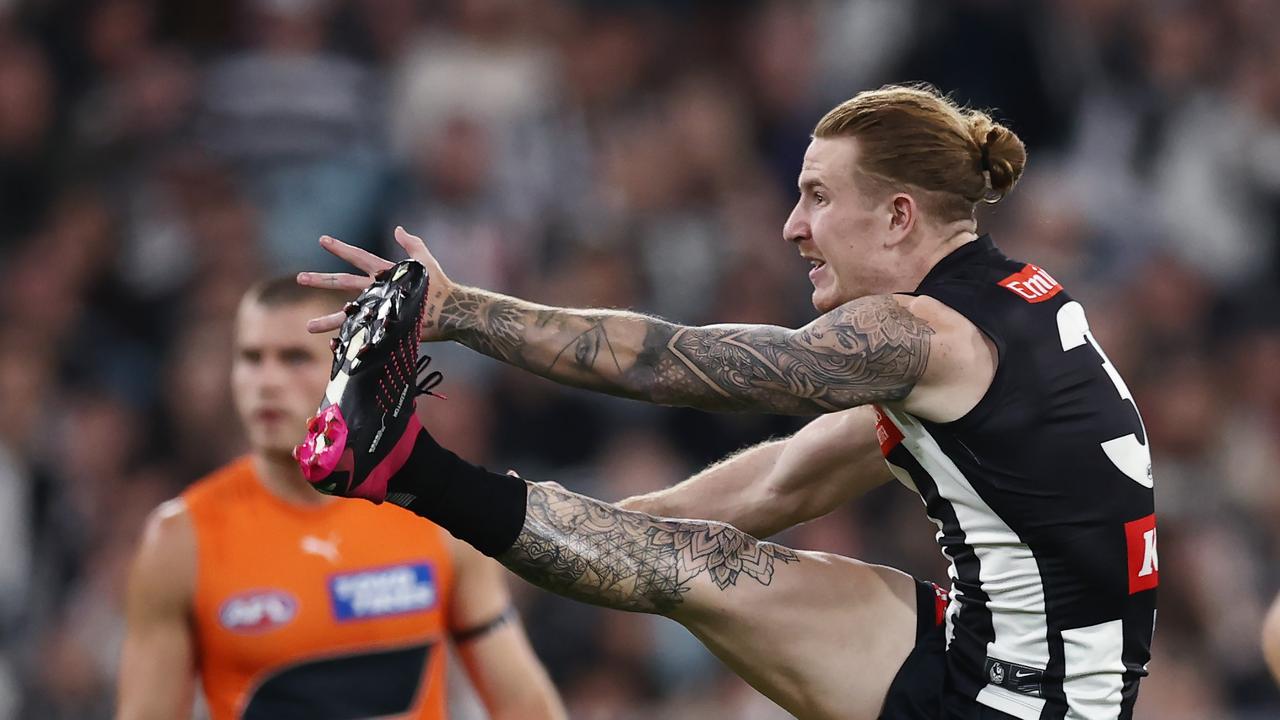From the relocation of Port Adelaide’s China clash to the postponement of the AFL season – inside the coronavirus’ hit on football
In late February, AFL chief Gillon McLachlan said the league had ‘limited exposure’ to the coronavirus crisis. Weeks later it had postponed the men’s season after one round and cancelled the women’s competition. So what happened?
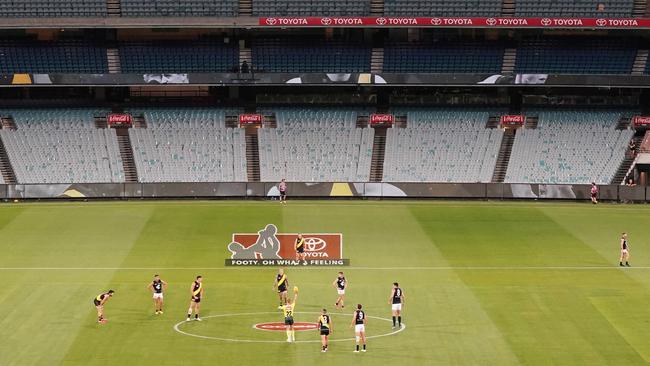
AFL
Don't miss out on the headlines from AFL. Followed categories will be added to My News.
- AFL players on expiring contracts left in limbo because of coronavirus
- How to get the most out of your Advertiser digital subscription
In his presidents address at the Crows Members’ Meeting at Adelaide Oval, Rob Chapman addressed the elephant in the room.
Looking forward to the season ahead and announcing yet another profit for the club, Chapman – a managing director at BankSA and chief executive at St George Bank – forecasted choppy seas on the horizon.
“We have challenges, you are all hearing about the economy even in recent weeks and I was determined to not say coronavirus (in my speech),” he told the crowd at the Magarey Room.
“But there are challenges and we need to be prepared for them.”
Watch sport on Kayo. Anywhere. Anytime. Just $25/month, cancel anytime. New to Kayo? Get your 14-day free trial & start streaming instantly >
But surely not even Chapman could have predicted the impact the virus was to have on the nation’s biggest sporting organisation, and how it now potentially threatens the financial viability of its clubs.
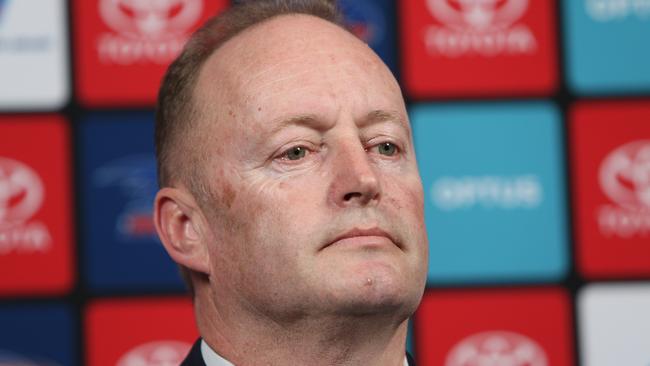
On Sunday when he announced the season would be postponed until May 31st at the earliest, as the country locks down amid the crisis, AFL chief executive Gillon McLachlan said the spread of COVID-19 was “unprecedented in its impact” on the game.
“To say this is the most serious threat to our game in 100 years is an understatement,” he said.
“It is unprecedented in the impact it is having on our game and the wider community, and as a community and as a code, we all need to take the unprecedented and required actions to get through this together.”
Collingwood president Eddie McGuire had already described as a “nuclear bomb” that had hit the AFL.
Like the spread of the virus around the world, the impact of COVID-19 on the game has been rapid.
When the Crows president made that speech on March 2, just 20 days before the season was postponed, coronavirus was being spoken about in AFL circles daily.
But that was centred around one game – Port Adelaide’s China game against St Kilda planned for May 31 in Shanghai.
For more than a month, speculation raged around whether the match, held 800km away from the epicentre of the coronavirus outbreak in Wuhan at the end of 2019, would actually be held in China because of the increasing spread of the virus.
For weeks the AFL said it was business as usual, and it would press on with the match unless it received increased safety warnings related to the coronavirus situation in China.
Not even a Federal Government ban on Chinese tourists on February 3 changed the official position of the AFL.
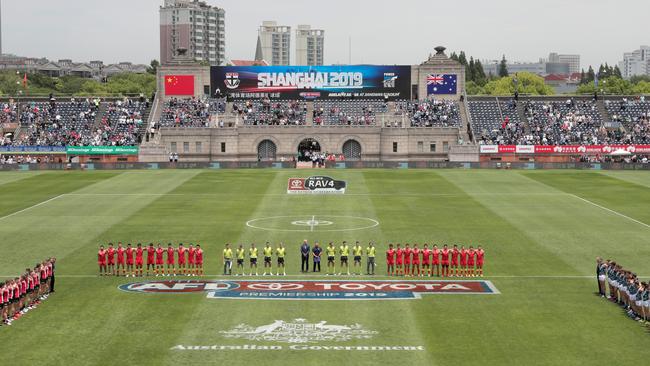
But The Advertiser understands that behind the scenes there was an acceptance the game could not be played in China, and the contingency plans were starting to be drawn up.
Then on February 6 came a statement from Shanghai recommending all sporting events in the city be suspended or postponed until the coronavirus “threat is over”.
Formula One first tried postponing its Chinese Grand Prix, scheduled for Shanghai on April 19, eventually binning it on February 13 after the World Health Organisation declared the coronavirus a global health emergency.
By then, Port Adelaide was saying it would take a “no-health risk” approach to playing in China, but a decision for the AFL and the two clubs was four to six weeks away.
While the public rhetoric was that the players were keen to go to China, backed up in their numerous interviews throughout the week, one told The Advertiser after the F1’s decision that there was no way they could go to Shanghai.
Just over a week later, Port Adelaide for the first time publicly acknowledged the China game may not go ahead because of the virus.
Soon after, some of the official travel agencies of the match froze sales of packages to Shanghai because of the worsening situation around the world, while the AFL’s official airline, Virgin, stopped flights to China.
On February 26, the Federal Government for the first time revealed it would consider cancelling events with big crowds, such as AFL matches, if Australia experienced a major coronavirus outbreak.
But this was only as a last resort and the focus in AFL circles went back to the status of Port Adelaide’s game.
In fact, two days later McLachlan said the AFL had only “limited exposure” to the virus.
“Things may change. Because we’re a domestic game and, at the moment, the coronavirus has implications for those with supply chain or international links, and that’s not where we’re at,” McLachlan said.
“So, as we sit here today, without looking too far into the future, our economic exposure is limited.”
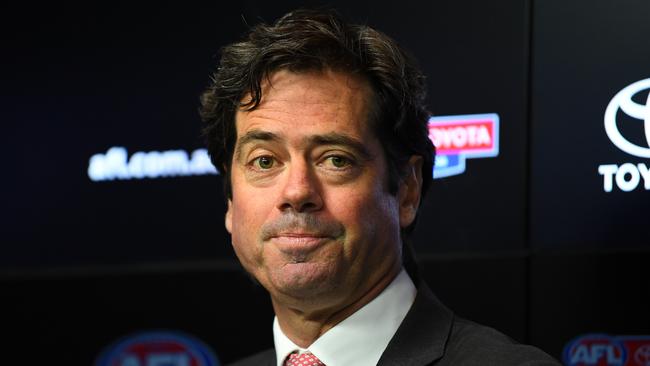
To give the league’s season launch after the Marsh Community Series had wrapped up clear air, the AFL, which was waiting for a decision by the Federal Government to call off the game, made the unsurprising announcement in the first week of March that the game would be shifted back to Melbourne.
On that day the organisation’s general manager of clubs and broadcasting Travis Auld said the AFL would be ready for any potential curveballs the coronavirus throws at the season, including the possibility of closed games – which was becoming a common sight in sporting events in Europe.
Two weeks later, and with just 25 hours to go before the first game of the season was scheduled, there was a real fear that the AFL would have to pull the plug.
First, young Fremantle player Sam Switkowski presented to the club with flu-like symptoms after recently spending time with a friend who had returned from China and was sent for tests for COVID-19.
He was cleared, but it showed just how real the situation was for clubs, and fan lockouts were put on the table by the AFL when McLachlan declared “if mass gatherings are suspended then we will play games in stadiums with no crowds”.
The prospect of fan lockouts, however, was more expected from Round 5 and the season opener between Richmond and Carlton was still expected to be played in front of a packed MCG.
Switkowski’s scare prompted numerous clubs to shut down visitor access to their football departments to minimise the risk of exposure to their players.
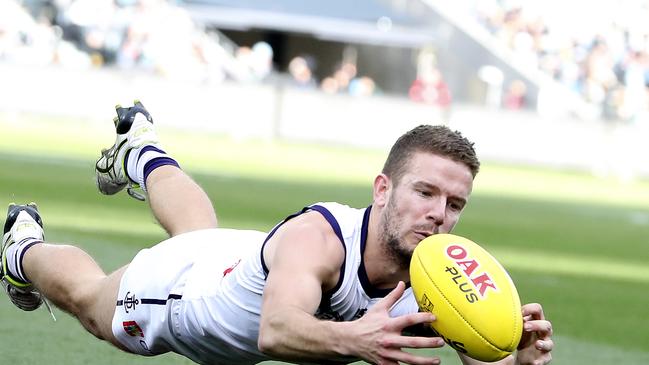
While players were separated from adoring fans at season launches, skippers of all 18 AFL clubs gathered in Melbourne for the annual captains day.
Despite the spread of the virus wreaking havoc around the world, the largest tennis tournament outside the Grand Slams in Indian Wells was cancelled while event after event was closed off to spectators or, in the case of the Serie A, suspended.
But then, Utah Jazz centre Rudy Gobert tested positive to coronavirus right before the tip-off of his side’s match against the Oklahoma City Thunder, prompting the NBA to suspend its season indefinitely.
In the space of a day, the AFL had gone from steadfast in its view that the season would go ahead as planned to not being able to guarantee Round 1 would be played at all.
The Federal Government’s decision to restrict gatherings of more than 500 people at sporting events, festivals, conferences and major public events further put the pressure on the AFL.
But on a day where the Australian cricket team took on New Zealand at an empty SCG, league chiefs opted to push on without crowds for as long as they can after emergency talks.
Crowds were also banned at that weekend’s AFLW matches.
Now that decision had been made, the AFL and clubs discussed the big impact it would have.
The 18 clubs, which stand to lose between $8 million and $15 million because of the coronavirus impacts, were told they must find up to $5 million each in savings.
Crows chief Andrew Fagan said the AFL’s future fund, last recorded at $60 million, would not be “any where close enough” to deal with the financial impacts of the spread if “the worst case scenario” of the crisis hit the league and clubs.
There was a very real fear that some clubs, and indeed the AFL, could be bankrupt if the season doesn’t go ahead, as the league and club presidents and chief executives met over the weekend.
Amid fears of the hit the league could take from a loss of broadcast revenue should games and rounds get cancelled because of the coronavirus, more than $1.09 billion was at stake if the season was abandoned, the talks turned towards trying to cram in games as quickly as possible ahead of any pending shutdown.
Clubs playing on average of every four games to counter any shutdown and a mini-draft to supplement lists to deal with this load were raised by the league ahead of a key phone hook-up with every AFL and AFLW player on Monday night.
After first raising it on the weekend, the AFL postponed all state leagues including the SANFL until May 31, while McLachlan announced a 17-round season to adjust to the threat.
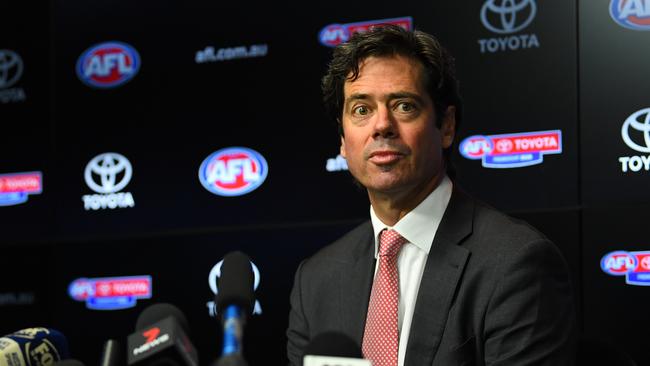
But as Collingwood captain Scott Pendlebury awaited test results in quarantine, the powerful players’ union pushed back at the cut of rounds.
The AFL breathed a sigh of release when Pendlebury’s results came back negative, but had to push back a decision on whether the Tigers-Blues match would go ahead.
Further complicating the matter was the Federal Government further restricting the number allowed to gather, now at 100 in indoor areas and 500 outdoors.
A day before the season was meant to start, the AFL conducted marathon discussions with the Federal Government and clubs before a five-hour meeting of its Commission and “cabinet” created to deal with the coronavirus pandemic.
McLachlan believed football should be played, when nearly every other major sport decided not to, but the Commission needed convincing.
Numerous clubs, including people within Carlton who were due to play the next day, believed the start would be postponed.
But on Wednesday night, McLachlan emerged to reveal the most anticipated decision in the game’s history, that the AFL would press on with its “153-game journey”.
McGuire said the decision changed nearly by the minute in that final meeting, but what once was the AFL’s nightmare – Round 1 beginning without any crowds allowed – quickly became its best option.
Balls were bounced, in empty stadiums to eerie silence, as the game pressed on the only way it could.
The AFL got through six games on Thursday, Friday and Saturday – and even won some new fans when games were broadcasted to the live-sport deprived America.
But as we’ve found throughout this crisis, the goalposts can shift almost immediately and a new day on Sunday brought another threat to the season.
After the biggest daily spike in cases in South Australia, on Sunday Premier Steven Marshall made the unprecedented decision to shut the state’s borders from Tuesday while Victoria, NSW and the ACT prepared to go into lockdown.
Prime Minister Scott Morrison called on Australians to cancel all non-essential travel within the country.
As games were played at Marvel Stadium and the MCG, the AFL held an urgent teleconference with club chief executives.
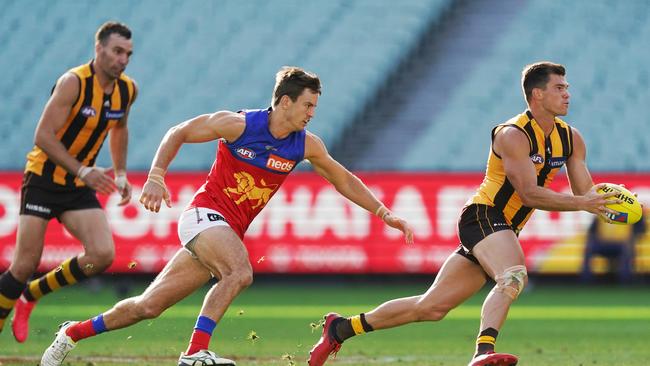
During halftime of the Hawthorn versus Brisbane match, McLachlan announced that after Round 1 was complete the season would be put on ice until the end of May – with a review by the end of April to determine whether this suspension would need to be extended.
The AFL and clubs will discuss how to “immediately cut costs” over the coming days.
Port Adelaide chairman David Koch said the future of clubs were at stake – changes to the football department soft cap, pay cuts and even job losses are expected to take hold soon.
McLachlan said the AFL was facing “our biggest financial crisis in our history” after being “stood down by something bigger”.
“I’d never thought it would come to this,” he said.
He isn’t alone.
Originally published as From the relocation of Port Adelaide’s China clash to the postponement of the AFL season – inside the coronavirus’ hit on football


